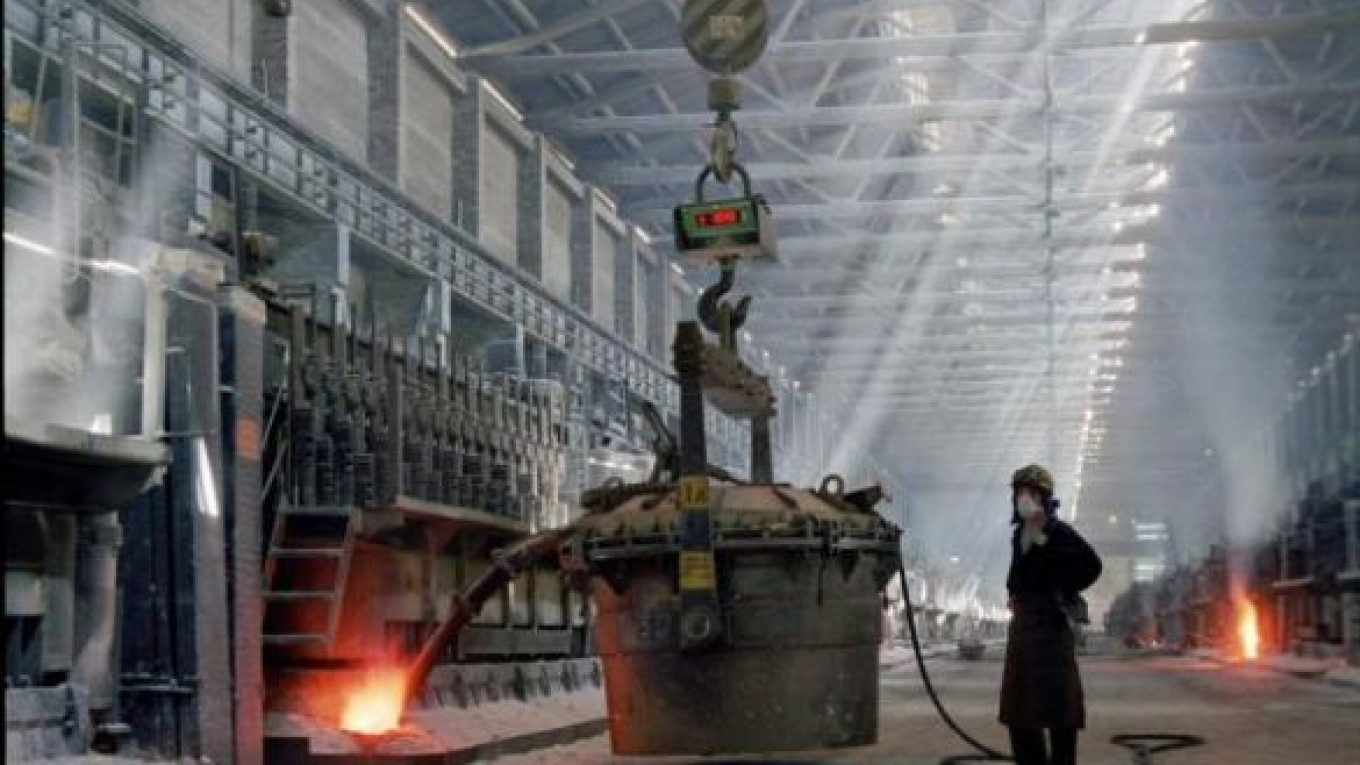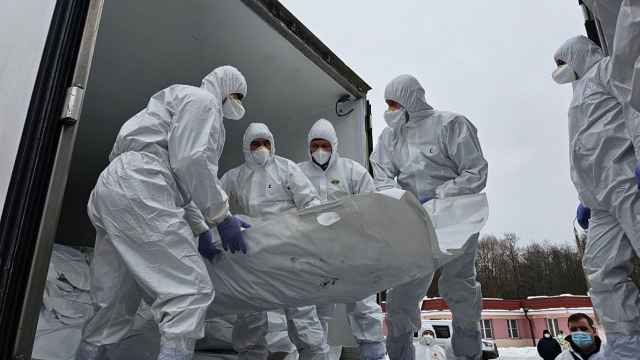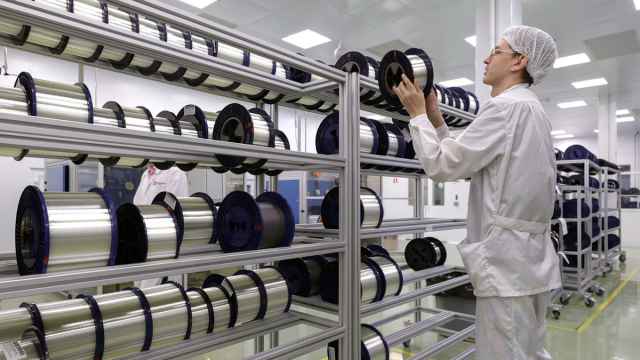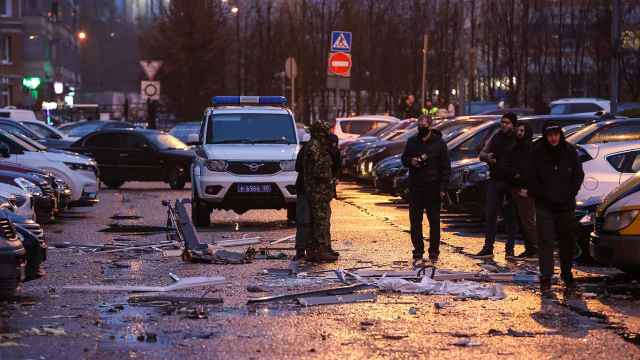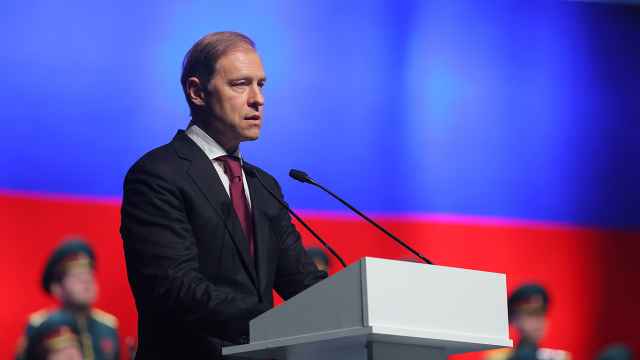The world’s largest aluminum-maker, RusAl, announced plans Monday to cut output by 7 percent this year amid oversupply and a drop in metal prices, a move that might provoke a wave of worker unrest in the regions.
The company’s board of directors approved the decision, RusAl said, following the announcement of unimpressive financial results. The aluminum giant posted a net loss of $55 million in 2012, its first since the crisis year of 2008.
RusAl will reduce its annual production by 300,000 tons at its less efficient smelters this year, down from 4.2 million tons in 2012, the company said in a statement. The plan envisages a dramatic adjustment to an initial program, which involved a gradual reduction of approximately the same production volumes over the next five years.
In a retaliatory move, workers at the Bogoslovsky smelter, in the Sverdlovsk region, which is facing the capacity reduction of 150,000 tons at its electrolysis unit, resumed a hunger strike, claiming that RusAl is not delivering on its obligations.
Despite promises to maintain the plant’s electrolysis operations, the company “is doing everything it can to close … manufacturing as soon as possible,” one of the strike participants, Ildus Khakimov, told RIA-Novosti on Monday.
He also said people are being forced to leave their jobs at the facility after seeing their salaries halved. The 10 former and current workers participating in the strike are worried that the whole smelter will be closed, Khakimov told Interfax. The smelter workers started a hunger strike in September last year after RusAl announced plans to close the electrolysis unit. As a result, the aluminum maker signed an agreement with the regional authorities and the smelter’s management, promising to preserve jobs.
In a statement released Monday, RusAl vowed that capacity reduction would be subject to government approval, with the affected workers to be offered “alternative employment opportunities.”
The company initially planned to gradually cut output at four of its smelters by 275,000 tons by 2018, in line with its capacity optimization program adopted last year. The facilities outlined in the program include Nadvoitsky in Karelia republic, Volkhovsky in the Leningrad region, as well as Bogoslovsky and Novokuznetsky smelters in the Urals region.
RusAl said the intention to carry out a more dramatic cut had been driven by the company’s efforts to remain competitive amid the industry’s excessive capacity, high energy tariffs and a decline in aluminum prices.
“The situation in the aluminum market in the last 12 months requires producers to rationally approach the utilization of existing capacities and the commissioning of new ones,” RusAl chief executive Oleg Deripaska said.
The capacity reduction is likely to help the company improve its financial performance, with the four smelters outlined in the program being loss making primarily due to high electricity costs in the regions of their location, said Oleg Petropavlovsky, an analyst at BCS brokerage. The four plants together produced only 250,000 tons of aluminum last year, he said.
The announcement of the adjusted plans came as RusAl disclosed last year’s financial results. The company posted a net loss of $55 million in 2012 compared with a net profit of $237 million a year earlier.
The company last saw a record $5.98 billion net loss in 2008, which analysts said was incurred primarily by write-offs attributed to the difference in exchange rates and decline in value of the 25-percent stake in Norilsk Nickel owned by RusAl.
RusAl’s revenue slid by 11.4 percent in 2012 to $10.9 billion, which the company said was the result of a drop in aluminum and alloy sales caused by falling prices.
Deripaska pointed out that last year was “particularly challenging for the aluminum industry,” since metal prices in London fell by 15.7 percent from a year earlier, “taking a large share of global production capacity to or below break-even level.”
RusAl’s closest rival, U.S.-headquartered Alcoa, announced in January last year that it would slash 12 percent of its smelting capacities globally in an effort to cut costs amid falling metal prices.
Deripaska told Bloomberg Television at that time that his company was considering cutting output by 6 percent over the following year and a half.
Meanwhile, the measures announced by RusAl on Monday might result in bigger unrest in the towns where the four smelters facing capacity reduction are located.
The Nadvoitsky smelter workers sent a petition to the government last month, asking to prevent the facility from closing.
The plant’s workers “sit on a powder keg that is about to blow,” the letter said, RIA-Novosti reported. Although pointing out that they “don’t want to initiate … social unrest” the workers warned that they might follow the example of Pikalyovo residents if the smelter is closed.
Residents of Pikalyovo, in the Leningrad region, blocked traffic on the highway from Vologda to Novaya Ladoga in 2009, causing a 400-kilometer-long traffic jam.
Contact the author at [email protected]
Related articles:
A Message from The Moscow Times:
Dear readers,
We are facing unprecedented challenges. Russia's Prosecutor General's Office has designated The Moscow Times as an "undesirable" organization, criminalizing our work and putting our staff at risk of prosecution. This follows our earlier unjust labeling as a "foreign agent."
These actions are direct attempts to silence independent journalism in Russia. The authorities claim our work "discredits the decisions of the Russian leadership." We see things differently: we strive to provide accurate, unbiased reporting on Russia.
We, the journalists of The Moscow Times, refuse to be silenced. But to continue our work, we need your help.
Your support, no matter how small, makes a world of difference. If you can, please support us monthly starting from just $2. It's quick to set up, and every contribution makes a significant impact.
By supporting The Moscow Times, you're defending open, independent journalism in the face of repression. Thank you for standing with us.
Remind me later.


